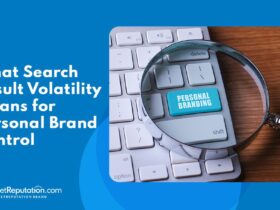In the digital age, your online reputation precedes you. Customers often research a company before engaging with its offerings, even if the transaction is offline. By maintaining a professional website, active social media presence, and responsive customer service, you can shape how potential customers perceive your brand and establish yourself as an industry leader. Building a positive online reputation is a long-term process, but the rewards are worth the effort.
Reputation marketing combines marketing with reputation management to enhance your company’s online presence and attract new customers by promoting positive content and leveraging a positive reputation as a marketing tool. Understanding and implementing reputation marketing strategies, which differ from reputation management, are crucial for businesses to build trust, foster customer loyalty, and drive growth.
Key Takeaways
- Maintaining a positive online reputation is a long-term process, but the rewards are worth the effort.
- Monitoring your online presence and setting up brand monitoring alerts can help you stay informed about online conversations related to your brand.
- Designing a user-friendly website is essential for creating a positive online impression, as it is like a digital business card.
- Engaging on social media and responding to comments and reviews can build trust with current and potential clients.
- Promoting positive reviews and handling negative feedback effectively are crucial for managing your online reputation.
Monitoring Your Online Presence
In the digital age, your brand’s online reputation is crucial to your business success. Before you can start building a positive online reputation, you need to understand your current standing. Online reputation monitoring is the first step in this process.
Setting Up Brand Monitoring Alerts
Begin by setting up alerts to track mentions of your company across the web, including social media platforms, review sites, and news articles. This allows you to stay informed about what people are saying about your brand. By monitoring these brand sentiment analysis signals, you can quickly identify any potential issues or areas for improvement.
Analyzing Sentiment and Reach
Once you have your monitoring system in place, take the time to analyze the sentiment of these mentions. Are they positive, negative, or neutral? This will give you a clear picture of how your brand is perceived online. Additionally, measure the social media reach of your online presence to understand how many people are engaging with your brand. This information will help you identify areas for improvement and track the success of your reputation-building efforts.
| Metric | Current Value | Target Value |
|---|---|---|
| Positive Mentions | 65% | 80% |
| Social Media Reach | 50,000 | 75,000 |
| Response Time to Feedback | 24 hours | 12 hours |
By consistently monitoring your online presence, analyzing sentiment, and measuring reach, you’ll be well on your way to building a strong, positive reputation for your brand.
Creating a Professional Website
Your website is the digital face of your business, serving as an online business card for potential customers. Invest in a clean, user-friendly website design that clearly communicates your brand’s values and offerings. Ensure that important information, such as your company description, contact details, and customer reviews, is easily accessible.
A well-crafted website design can help establish your credibility, improve customer engagement, and enhance your online visibility. According to a study from GWI, over a third (43%) of consumers across all ages turn to social networks when looking for more information about brands, products, or services.
When creating your user-friendly website, consider the following key elements:
- Intuitive navigation and clear call-to-action buttons
- Visually appealing and responsive layout
- Detailed product or service descriptions
- Prominent display of customer reviews and testimonials
- Easy-to-find contact information and social media links
Investing in a professional website design can be a game-changer for your online presence, helping you stand out in a crowded digital landscape and build trust with your target audience.
Optimizing Your Website for Search Engines
To further enhance your online visibility, optimize your website for search engines by incorporating relevant keywords in your content, meta tags, and URLs. This will help your website rank higher in search engine results, making it more accessible to potential customers.
Additionally, ensuring your website is mobile-friendly and loads quickly can improve your search engine rankings and provide a better user experience for your visitors.
Engaging on Social Media
In the digital age, social media has become a powerful tool for building and maintaining a positive online reputation. By actively engaging with your audience, you can showcase your brand’s expertise, address customer concerns, and generate valuable goodwill. To effectively leverage social media for reputation management, focus on social media engagement, content marketing, and responsive customer service.
Sharing Valuable Content
Establish your brand as an industry expert by consistently sharing informative, engaging content on your social media platforms. This could include blog posts, infographics, videos, or thought-leadership pieces that provide value to your target audience. By positioning your brand as a trusted resource, you’ll cultivate a loyal following and enhance your online reputation.
Responding to Comments and Reviews
Promptly address both positive and negative comments or reviews on your social media channels. Responding to customer feedback demonstrates your commitment to providing excellent customer service and shows your audience that you value their opinions. Acknowledge positive reviews and gracefully handle any criticism, offering solutions or clarification as needed. This proactive approach can turn negative situations into opportunities to showcase your brand’s responsiveness and professionalism.
| Metric | Statistic |
|---|---|
| Consumers who agree that responding to customers on social media makes brands the most memorable | 51% |
| Consumers who regularly read online reviews when browsing for local businesses | 76% |
| Consumers who feel that online business reviews are as trustworthy as personal recommendations from friends or family | 46% |
| Consumers who primarily follow brands on social media to stay informed about new products or services | 68% |
| Consumers who value how quickly a brand can respond to their needs on social media | 76% |
| Consumers who expect responses from brands on social media within 24 hours or less | Over 50% |
By actively engaging with your audience on social media, sharing valuable content, and promptly responding to comments and reviews, you can effectively manage your online reputation and position your brand as a trusted industry leader.
Online Reputation Management Strategies
Proactively managing your online reputation is crucial for long-term success. Encourage satisfied customers to leave positive reviews on relevant platforms, as these testimonials can help build trust and credibility with potential customers. When faced with negative feedback, respond quickly and empathetically, taking responsibility and offering solutions. Effectively managing both positive and negative reviews can help mitigate the impact of any reputational challenges and strengthen your overall online presence.
Promoting Positive Reviews
According to a survey by BrightLocal, 84% of people trust online reviews as much as personal recommendations. Leverage this by proactively asking your satisfied customers to leave positive reviews on platforms like Google, Yelp, and Facebook. Offer incentives, such as discounts or free products, to encourage review submissions, but be mindful of any platform’s guidelines to avoid any potential issues.
Handling Negative Feedback
The BrightLocal Local Consumer Review Survey found that 94% of consumers say that a negative online review has convinced them to avoid a business. When faced with negative feedback, respond quickly and professionally. Take responsibility, apologize sincerely, and offer a solution to address the customer’s concerns. This approach can help turn a negative situation into an opportunity to demonstrate your commitment to customer satisfaction and build trust with your audience.
| Statistic | Value |
|---|---|
| Consumers who read reviews when browsing local businesses | 77% |
| Consumers who expect brands to respond within 24 hours on social media | 79% |
| Consumers who have stopped considering a business due to negative reviews | 60% |
| Consumers who will take action after reading a positive review | 72% |
| Consumers who read less than 10 reviews before forming an opinion about a business | 90% |

Effective online reputation management requires a proactive and strategic approach. By promoting positive reviews and addressing negative feedback promptly and professionally, you can build trust, enhance your brand’s credibility, and protect your reputation management in the digital landscape.
Conclusion
Building and maintaining a positive online reputation is an ongoing process that requires consistent effort and attention. By monitoring your digital footprint, creating a professional website, engaging on social media, and implementing effective reputation management strategies, you can establish your brand as a trusted and respected industry leader. Remember, your online reputation can have a significant impact on your business success, so invest the time and resources necessary to shape the narrative surrounding your brand building and digital presence.
The power of online reviews cannot be overstated, as 85% of consumers conduct research before making a purchase and 89% trust online reviews. Additionally, a difference of just one “star” in the average rating can lead to a 5-9% difference in revenues. By effectively managing your online reputation, you can cultivate trust with potential customers, improve your search engine visibility, and gain valuable insights to drive business improvements.
Ultimately, a positive online reputation is a strategic asset that can help you attract customers, talent, and investors, while also protecting your business from legal and financial risks. Investing in online reputation, brand building, and a strong digital presence is a crucial step towards long-term success in today’s competitive marketplace.
FAQ
How can a positive online reputation benefit my business?
A positive online reputation can have a beneficial effect on your business goals. Your reputation precedes you, and in the digital age, customers often research a company before engaging with its offerings, even if the transaction is offline. By maintaining a professional website, active social media presence, and responsive customer service, you can shape how potential customers perceive your brand and establish yourself as an industry leader.
How do I monitor my current online reputation?
Monitoring your brand’s online presence is essential. Set up alerts to track mentions of your company across the web, including social media platforms, review sites, and news articles. Analyze the sentiment of these mentions to gauge whether the overall perception of your brand is positive or negative. Additionally, measure the reach of your online presence to understand how many people are engaging with your brand. This information will help you identify areas for improvement and track the success of your reputation-building efforts.
What should I focus on when creating a professional website?
Your website is the digital face of your business, serving as an online business card for potential customers. Invest in a clean, user-friendly design that clearly communicates your brand’s values and offerings. Ensure that important information, such as your company description, contact details, and customer reviews, is easily accessible. A well-crafted website can help establish your credibility, improve customer engagement, and enhance your online visibility.
How can I effectively engage on social media to build a positive reputation?
Social media is a powerful tool for building and maintaining a positive online reputation. Actively engage with your audience by sharing valuable, informative content that positions your brand as an industry expert. Furthermore, respond promptly and professionally to both positive and negative comments or reviews, demonstrating your commitment to customer satisfaction. Effective social media engagement can help you connect with your target audience, address concerns, and generate goodwill for your brand.
What online reputation management strategies should I implement?
Proactively managing your online reputation is crucial for long-term success. Encourage satisfied customers to leave positive reviews on relevant platforms, as these testimonials can help build trust and credibility with potential customers. When faced with negative feedback, respond quickly and empathetically, taking responsibility and offering solutions. Effectively managing both positive and negative reviews can help mitigate the impact of any reputational challenges and strengthen your overall online presence.















